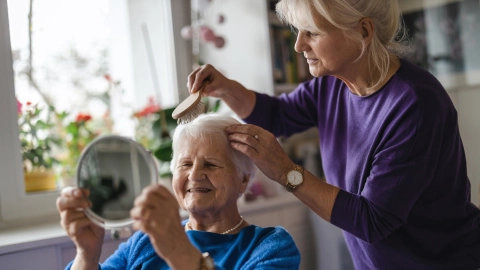Services Self-help for families
Self-help groups for families and loved ones of people with disabilities, chronic illnesses or addiction problems allow them to share their experiences. There are self-help groups catering to a wide range of issues – from addiction to care.
At a glance
- Self-help groups provide support for families and loved ones of people with chronic illnesses, disabilities or addiction problems.
- In self-help groups, they can meet other people in similar situations and share their experiences.
- Self-help contact points help people find a group to suit them.

What is meant by self-help for families?
Families and loved ones of people with disabilities, chronic illnesses or addictions often suffer a great deal of stress, as they worry about their parents, partner, friend or child, take responsibility for them or care for them. Their own needs are often neglected. Sometimes, the health condition impacts family life as a whole, puts strain on friendships and pushes relatives and loved ones to their limits.
In self-help groups, families can meet other people in similar situations. They can talk openly about their worries and fears, exchange information and learn from one another.
What do self-help groups for families offer?
There are self-help groups for families catering to a wide range of issues. They may be geared towards specific relatives or families or they may include families in existing groups for sufferers of the relevant health issues. Groups that are limited to families and loved ones offer the advantage of providing a safe space. In this forum, families and loved ones can speak openly about their own concerns and needs, without worrying that other family members may feel burdened or distressed as a result.
There are many self-help groups for families in the areas of addiction and mental health in particular. With addiction specifically, families are often overwhelmed and in need of reassurance. Sometimes, the stress they suffer causes them to become ill themselves. The same applies to families in which one member needs long-term care. Many self-help groups offer support in this area also. In addition, self-help groups for loved ones can be found for a very wide range of health conditions. All of these groups bring family members together, allow them to share their experience and knowledge and enable mutual support. Finding others who understand what they are going through helps many people to cope better with their life situation and with daily life with a loved one who is ill.
Some self-help associations – especially in the area of addiction – also offer specific groups for children. These provide children from families with similar experiences to meet one another and talk about their worries and concerns. This helps them realize that they are not alone with their problems. The other children they meet and the adult group leaders help them to find more effective ways to cope with their issues.
What are the benefits of self-help for families?
If a family member of a loved one is chronically ill or has an addiction or a disability, this often affects everyone who is close to them. Self-help for families therefore offers many types of support:
- Self-help groups and self-help associations allow families to find information about medical issues and questions relating to social law. They can also clarify practical issues – for example, relating to the long-term care of families.
- Conversations and joint activities provide emotional and psychological support that helps families cope more effectively with their situation.
- Relaxing leisure activities offer recreational opportunities.
- Meeting other people experiencing similar strain helps to break down the social isolation that is often suffered by family members and loved ones.
Where can I find a self-help group for families?
Local self-help contact and information points help people find a self-help group that meets their needs.
An overview of contact and information points is provided on the website of the National Contact and Information Point for Encouraging and Supporting Self-Help Groups (Nationale Kontakt- und Informationsstelle zur Anregung und Unterstützung von Selbsthilfegruppen – NAKOS).
Where can I find more information?
More information about the organization and independence of self-help services and about how the interests of people with disabilities and chronic illnesses are represented at a political level is provided in our self-help topic overview.
- BAG Selbsthilfe. Familienorientierte Selbsthilfe. Aufgerufen am 31.05.2022.
- NACOA Deutschland. Selbsthilfeangebote für Kinder und Jugendliche. Aufgerufen am 31.05.2022.
- Selbsthilfe Frankfurt. Angehörige – Sie sind nicht allein!
- Deutsche Hauptstelle für Suchtfragen (DHS). DHS-Memorandum: Angehörige in der Sucht-Selbsthilfe. Aufgerufen am 31.05.2022.
- Zetlitzer A, Doka S. Familienorientierte Selbsthilfe – ein Leitfaden zur Weiterentwicklung von Angeboten für Angehörige in der Selbsthilfe. Aufgerufen am 31.05.2022.
Reviewed by the German National Association for Self-Help (Bundesarbeitsgemeinschaft Selbsthilfe e.V. – BAG SELBSTHILFE).
As at:





